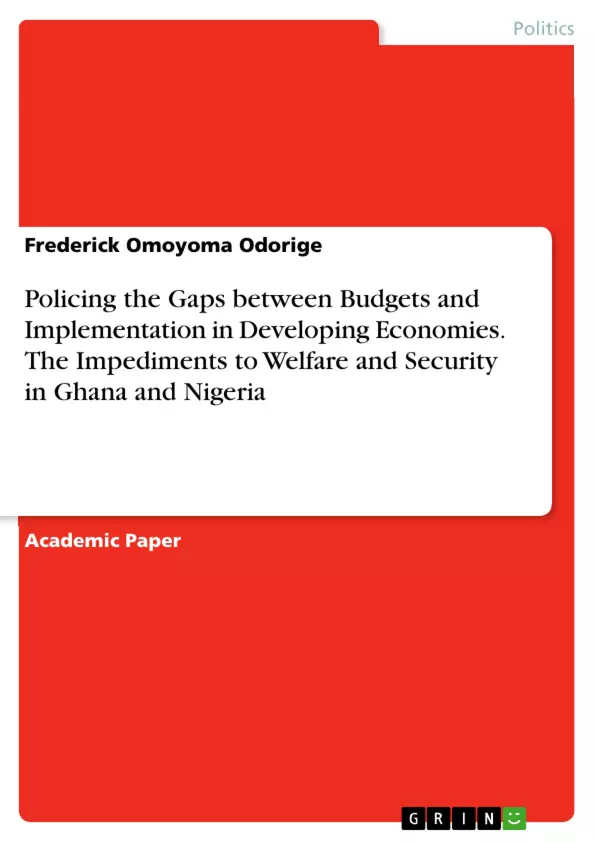This paper sets out to historicize on the trajectories of budgeting and their implementation in Ghana and Nigeria and make an analysis of some of their budgets and implementation and examine in detail, the causative factors orchestrating the phenomenon of improper budget planning and implementation.
Besides, the paper ascertains the role of law enforcement and anti-corruption agencies in budget policing and specifically examines some selected incidences of lapes within the implementation period. Furthrtmore, it identifies the impications of the prevalence of improper budget implementation and assesses the role of law enforcement and corruption agencies in both countries in order to ascertain detected lapses in implementation. To relate and connect an aspect of this paper with another of the author’s paper on the politics of godfatherism in Nigeria is also important.
The aim is to weigh a common factor bordering on bloated salaries of top government officials as it affects various aspects of governance and development. The paper also proffers recommendations on practical ways to arrest the malaise of under-implementation of budgets which has resulted in protracted underdevelopment.
Inhaltsverzeichnis (Table of Contents)
- Introduction
- Hypothesis
- Methodology
- History of Budgets
- Theoretical framework
- Stewardship Theory
- Theory of Class Struggle
- Roles and activities of two financial crime agencies
- Reasons for the Gap
- Politics
- Corruption
- Repitition and duplication of budget items
- Leakages and substandard supplies
- Lack of sincere economic policy
- Improper planning
- Wasteful spending and borrowing
- Lack of information
- Abandoned and inflated projects
- Weak interest from the citizens
- Discontinuity in political succession
- Lack of modalities for checking budget implementation
- Weak support for the civil society
- Late budget approvals
- Lack of policing mechanisms
- Slow judicial process
- Inadequate resources
- Graphic measurements of welfare as an indicator of Human Development in Nigeria: 2006-2015
- Outrageous cost of governance
- Insecurity and crime as a consequence of poverty
- Recommendations
Zielsetzung und Themenschwerpunkte (Objectives and Key Themes)
This paper examines the challenges of implementing national budgets in developing countries, specifically Ghana and Nigeria. The author explores the reasons behind the persistent gap between allocated budgets and actual implementation, arguing that the lack of effective policing and oversight mechanisms contributes significantly to this issue. The paper aims to highlight the detrimental effects of this gap on economic development and social welfare in these countries.
- The gap between budget allocation and implementation in developing economies.
- The role of policing and oversight mechanisms in ensuring budget accountability.
- The impact of corruption and political instability on budget implementation.
- The consequences of budget mismanagement on economic development and social welfare.
- The importance of effective law enforcement and anti-corruption agencies in closing the gap.
Zusammenfassung der Kapitel (Chapter Summaries)
The introduction sets the stage by highlighting the stark contrast between budgeted funds and actual implementation in many developing countries. It emphasizes the need for robust policing mechanisms to ensure accountability and bridge the gap between the budget and its realization.
The methodology chapter delves into the theoretical framework underlying the research, including the Stewardship Theory and the Theory of Class Struggle. It also explores the role of financial crime agencies in policing the budget implementation process.
The subsequent chapters dissect the various reasons behind the gap, focusing on factors such as political instability, corruption, leakages, inadequate planning, and lack of public awareness. The author examines the specific challenges faced by Ghana and Nigeria, drawing on historical examples and empirical data.
Chapter 5 presents a graphical analysis of welfare indicators in Nigeria, highlighting the negative correlation between budget mismanagement and human development. The chapter also delves into the issue of rampant corruption and its debilitating effects on the economy.
Schlüsselwörter (Keywords)
This paper explores the complex relationship between budgeting, implementation, and governance in developing countries. Key themes include budget accountability, corruption, law enforcement, anti-corruption agencies, economic development, social welfare, and the challenges of bridging the gap between planned budgets and actual implementation. The paper draws on examples from Ghana and Nigeria, highlighting the specific challenges and solutions applicable to these countries.
Frequently Asked Questions
Why is there a gap between budget planning and implementation in Ghana and Nigeria?
The gap is caused by factors such as corruption, political instability, wasteful spending, lack of economic policy, and weak policing mechanisms.
What is the role of law enforcement in budget policing?
Law enforcement and anti-corruption agencies are responsible for monitoring fund allocation and ensuring that budgeted projects are actually realized without leakages.
How does budget mismanagement affect human development?
Improper implementation leads to underdevelopment, poverty, and a lack of basic welfare and security services for the citizens.
What is the 'Stewardship Theory' mentioned in the paper?
It is a theoretical framework used to analyze how government officials should act as responsible stewards of public resources for the benefit of society.
What are the recommendations to stop budget under-implementation?
The paper suggests strengthening anti-corruption agencies, increasing transparency, and establishing better modalities for checking implementation progress.
- Quote paper
- Frederick Omoyoma Odorige (Author), 2017, Policing the Gaps between Budgets and Implementation in Developing Economies. The Impediments to Welfare and Security in Ghana and Nigeria, Munich, GRIN Verlag, https://www.grin.com/document/379444



